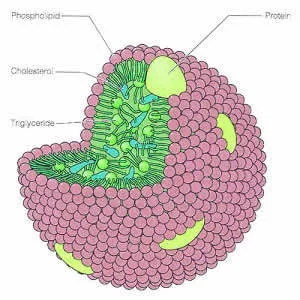A new study published in Cell Metabolism explains that simply raising high-density lipoprotein (HDL) levels may not always provide protection from heart disease. That is because HDL also increases the inflammatory response of macrophages which could counteract its anti-inflammatory effect in various other cell types.
See Also: Study: HDL Not Independent Heart Disease Risk Factor
Senior study author Marjo Donners of Maastricht University explains that HDL functions are not as simple as we think and greatly depend on the target tissues and cell types. Any clinical outcome is determined on the basis of the balance between its pro and anti-inflammatory effects.
For decades, HDL has enjoyed the reputation of being the good cholesterol. High levels of HDL have been associated with a lower risk of atherosclerosis. It does this by inhibiting inflammation in the endothelial and smooth muscle cells. On the other hand, high levels of LDL are known to deposit cholesterol in vessel walls.
While HDL helps in the degredation of bad cholesterol, it is still unclear as to the exact effect of HDL on the inflammatory response in macrophages. During this study, Donners and his his co-author Emiel van der Vorst of Maastricht University set out to answer this very question. They found that HDL enhanced inflammation in macrophages. This enhanced inflammatory effect provided one benefit and that was enhanced pathogen protection thus suggesting that patients with persistent infections or immune disorders could benefit from therapies that increase HDL levels.
There were however several limitations that complicate these clinical interpretations. First, this study focused on only acute inflammatory responses as opposed to chronic inflammatory conditions which basically characterise cardiovascular diseases. Second, the researchers did not examine macrophages specifically in the atherosclerotic tissue therefore HDL's beneficial or detrimental effects on the atherosclerotic plaque still need to be determined.
"For instance, in early
atherosclerosis, a proper macrophage response could result in more
effective scavenging and elimination of lipids and cellular debris,
which may alleviate disease, whereas at later stages, such exaggerated
responses may be detrimental because they destabilize the plaque," Donners
says. "Moreover, the overt anti-inflammatory effects in other cell types
should be taken into account, and it is the balance between these
opposite effects of HDL that will determine clinical outcome for
cardiovascular disease patients."
The researchers believe that more studies need to be conducted to evaluate the balance between HDL's cell specific effects in various pathologies to better determine their impact and to improve treatment strategies.
Source: Cell Metabolism
Image Credit: Wikimedia Commons










